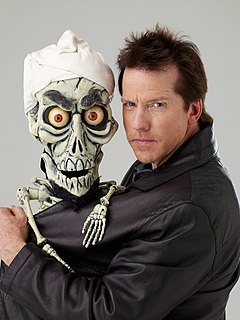A Quote by Ambrose Bierce
RIDICULE, n. Words designed to show that the person of whom they are uttered is devoid of the dignity of character distinguishing him who utters them.
Related Quotes
There is no character, howsoever good and fine, but it can be destroyed by ridicule, howsoever poor and witless. Observe the ass, for instance: his character is about perfect, he is the choicest spirit among all the humbler animals, yet see what ridicule has brought him to. Instead of feeling complimented when we are called an ass, we are left in doubt.
God utters me like a word containing a partial thought of him. A word will never be able to comprehend the voice that utters it. But if I am true to the concept that God utters in me, if I am true to the thought of Him that I was meant to embody, I shall be full of his actuality and find him everywhere in myself, and find myself nowhere.
Within a single scene, it seems to be unwise to have access to the inner reflections of more than one character. The reader generally needs a single character as the means of perception, as the character to whom the events are happening, as the character with whom he is to empathize in order to have the events of the writing happen to him.
A line runs from the meditations of the heart to the words of the mouth. The meditations are not clear to us until the mouth utters its words. If what the mouth utters is unclear or foolish or mendacious, it must be that the meditations are the same. But the line runs both ways. The words of the mouth will become the meditations of the heart, and the habit of loose talk loosens the fastenings of our understanding.
A character does seem to have a life of its own, but I have what I'd describe as a very fluid relationship with them - as I'm thinking of what they will be like, they shift in and out of focus - they are a projection of some idea inside of me, even if a character is inspired by an actual person, I'm well aware that it is not that person. My job is to identify the essence of the character, and to bring them to life long enough to commit the acts, say the words or simply "be" in a way that allows them to affect and be affected by other elements and events in the imaginary world of a story.
There is probably not one person, however great his virtue, who cannot be led by the complexities of life's circumstances to a familiarity with the vices he condemns the most vehemently--without his completely recognizing this vice which, disguised as certain events, touches him and wounds him: strange words, an inexplicable attitude, on a given night, of the person whom he otherwise has so many reasons to love.
































